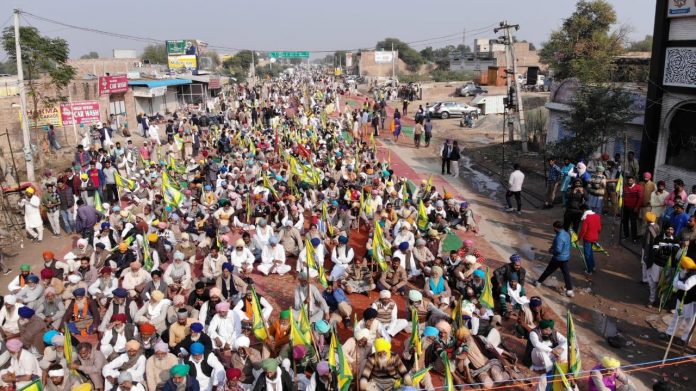New Delhi (ILNS): In a latest development, as per reports the Haryana Police has booked state Bhartiya Kisan Union (BKU) chief Gurnam Singh Charuni and several farmers on attempt to murder, rioting, causing obstruction in government duty and other charges for violations during their “Delhi Chalo” march.
Meanwhile, prohibitory orders under section 144 of the CrPC had been imposed in several parts of Haryana to prevent the assembly of people. A case was registered on November 26 under sections 307 (attempt to murder), 147 (rioting), 149 (unlawful assembly), 186 (obstructing any public servant in discharge of public functions) and 269 (negligent act likely to spread infection of disease dangerous to life) among others at the Parao police station on a complaint from Head Constable Pardeep Kumar as hundreds of farmers assembled on the GT road near Ambala Cantt to proceed towards the national capital.
The FIR names Charuni and several other unknown farmers as accused. According to it, the BKU Haryana chief and others had gathered near Mohra village in Ambala.
A case against some farmers from BKU (Charuni) and others from Punjab was also registered at Panipat for violations relating to breaking police barriers and other charges.
In the early morning hours today, security arrangements were tightened at the Delhi-Haryana border at Tikri as the farmers who have been opposing the farm law have gathered there in large numbers, despite being given permission to hold peaceful protests at the Nirankari Samagam Ground in Delhi’s Burari.
Similarly, on Friday nearly a thousand unidentified protesting farmers, riding on tractor-trailers, were booked by Meham police on charges of rioting, obstructing public servants from performing duty, assault or criminal force to the public servant and the violations of COVID-19 guidelines during their protest against the farm bills.
The Indian parliament in September this year passed the three contentious farm bills also known as agriculture bills. Since the passage of the agriculture bills there was an outrage especially among the farming community across the country. Though the government called the farm bills historic, the opposition slammed it as a death-warrant. The bills followed an uproar and high political drama, both inside and outside Parliament.
Nearly two months after the agriculture bills were passed, the farmers, especially from neighbouring states like Haryana and Punjab thronged into large numbers in the national capital braving winter chill demanding the government to roll back the three farm bills. The farmers have been demanding either the withdrawal of the three legislations or guarantee on the Minimum Support Price (MSP) for their crops through introduction of a new law.
The reason why the farming community has come in large numbers bearing the cold is their apprehension regarding the APMCs and the Minimum Support Price (MSP).
It is feared among the farmers that the new laws would end the monopoly of APMC mandis in farm products trading. Farmers believe that the laws will gradually end mandi system and this will automatically leave them at the mercy of the corporates.
The bill on agriculture markets seeks to allow farmers to sell their produce outside APMC ‘mandis’ to whoever they want. Farmers are expected to get better prices through competition and cost-cutting on transportation.
The farmers say that they are also apprehensive about not getting the government-promised Minimum Support Price (MSP) for their produce and are also concerned about the upper hand that huge agri-business companies and big retailers would have during negotiations. Moreover, it may actually lead to the reduction of benefits accruing to small farmers, because these huge companies will easily dictate the price at later stages.
Though the government has said the mandi system will continue, and they will not withdraw the Minimum Support Price (MSP) they currently offer either. But farmers are suspicious.
The government is firm on its decision to hold a meeting with the protesting farmers on December 3. Besides, it is argued that the government has so far did not try to assuage the concerns of the agitated farmers.


